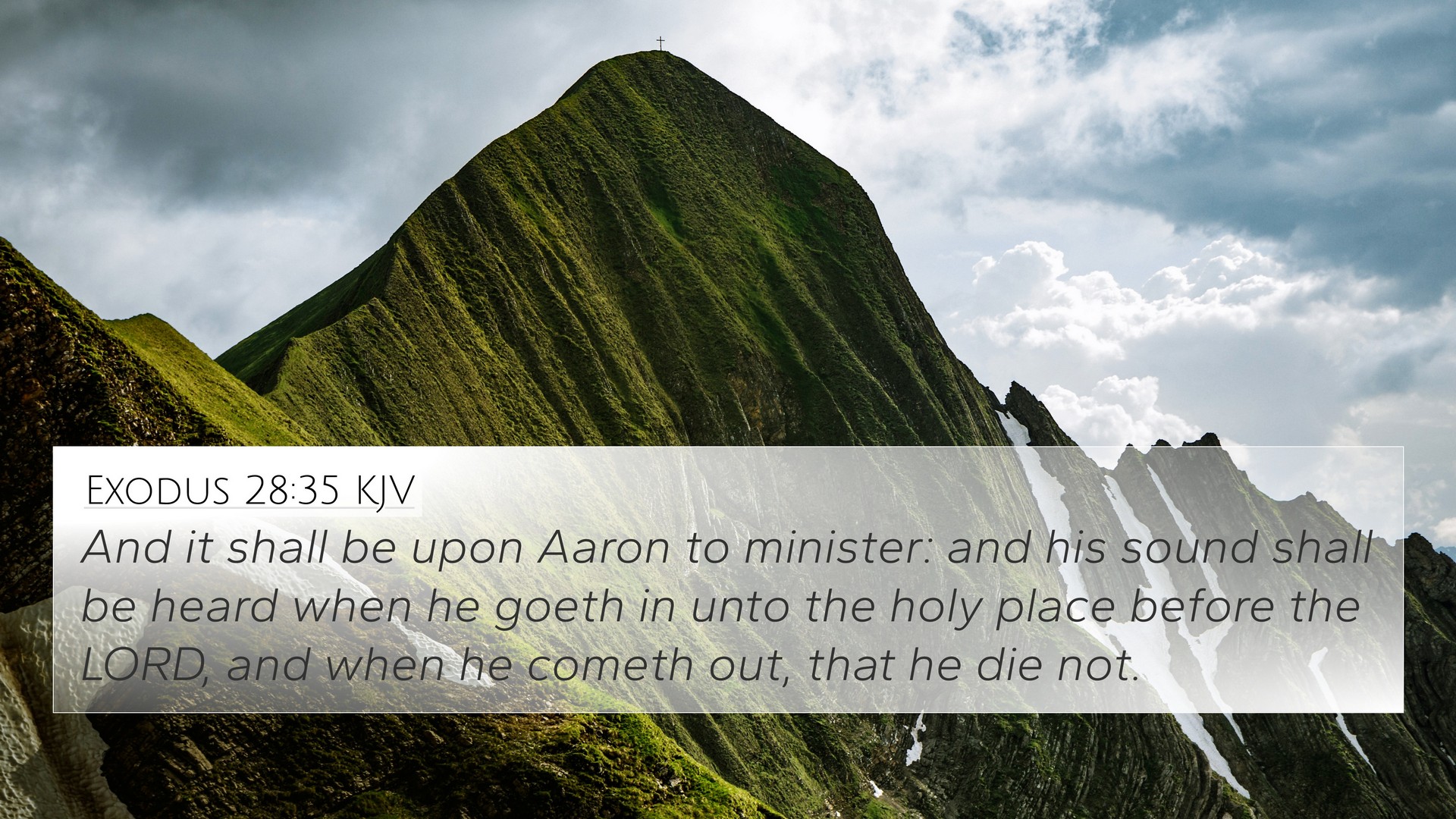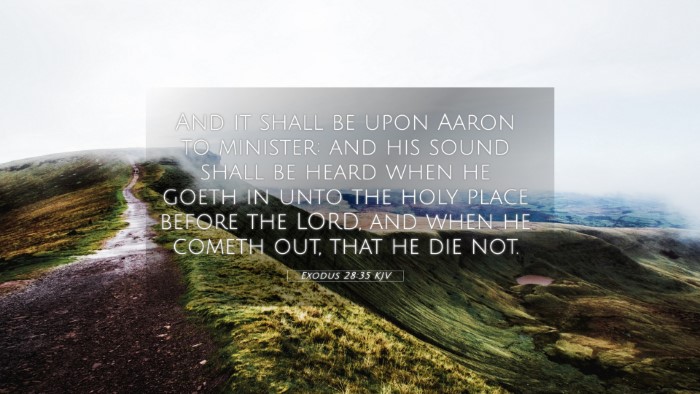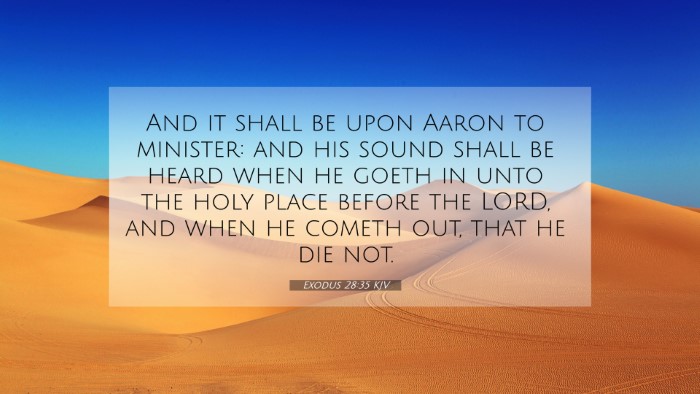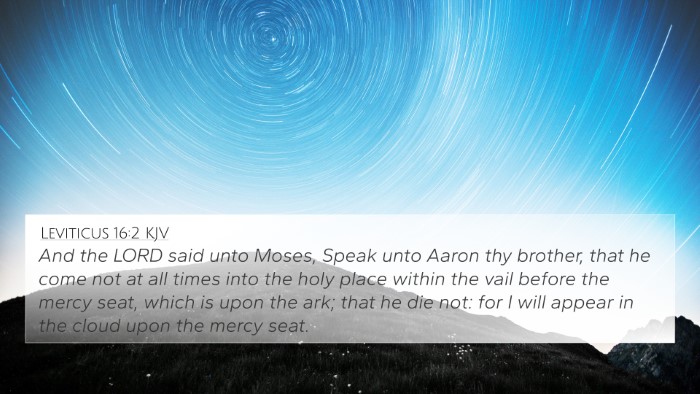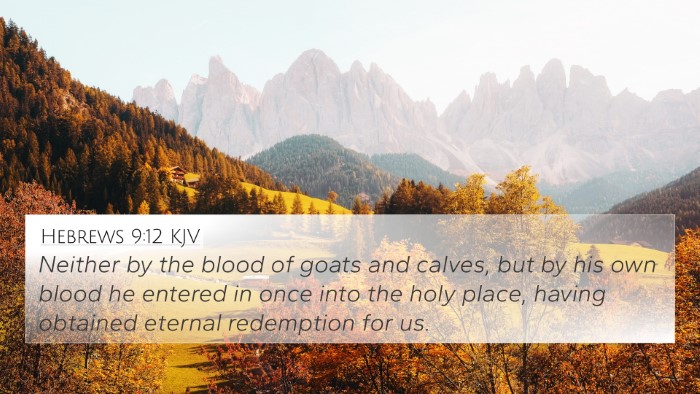Understanding Exodus 28:35
Verse: Exodus 28:35 states, "And it shall be upon Aaron to minister: and his sounds shall be heard when he goeth in unto the holy place before the LORD, and when he cometh out, that he die not." This verse is part of God's instructions to Moses regarding Aaron's priestly garments, particularly the robe of the ephod, which is outlined in the context of the duties of the High Priest.
Meaning and Interpretation
The verse emphasizes the significance of the sounds produced by the bells on the hem of Aaron's robe. These sounds served both a practical and spiritual function, ensuring that the High Priest could be heard as he moved in and out of the tabernacle, thus reminding everyone of his presence.
Commentaries Combined Insights
-
Matthew Henry Commentary:
Henry suggests that the bells symbolize the essential role of the High Priest in mediating between God and the people. The sound signifies life and the active ministry of intercession performed by Aaron. The idea of not dying emphasizes the sacredness of the ministry and the consequences of approaching God's presence without due reverence.
-
Albert Barnes Notes:
Barnes points out that the use of the bells also signifies the importance of order and carefulness in worship. The audible sign of Aaron’s movement serves as a reminder to the people of his role, indicating that he enters the presence of the Lord on their behalf. It's a visual and auditory reminder of God's holiness and the seriousness of approaching Him in worship.
-
Adam Clarke's Commentary:
Clarke elaborates on the symbolism of the bells, stating that they represent the joy and praise that should accompany the priest's entrance before God. The notion of “that he die not” reinforces the requirement of Holiness when engaging in acts of worship. Clarke assesses that it teaches believers about the reverence required when approaching God.
Cross-References and Thematic Connections
This verse connects with various other passages throughout the Bible, showing the interwoven nature of scripture. Here are 10 Biblical Cross-References that relate to Exodus 28:35:
- Leviticus 16:2: The instructions about entering the holy place emphasize the importance of proper approach to God.
- Hebrews 9:7: Discusses the High Priest entering the Holy of Holies with the blood, emphasizing the sacredness of this act.
- 1 Peter 2:9: Describes believers as a royal priesthood, reflecting the high calling of the priesthood now shared by all Christians.
- Nahum 1:15: The peace that comes from the feet of those who bring good news echoes the joy signified by the bells.
- Romans 12:1: Encourages believers to present their bodies as living sacrifices, a continuation of the sacrificial system overseen by the priests.
- Exodus 30:20: Discusses the requirement of holiness when entering the Lord's presence, reinforcing the cautions mentioned in Exodus 28:35.
- Matthew 27:51: The tearing of the temple veil signifies direct access to God, a fulfillment of the priestly role in connecting humanity to the Divine.
- Hebrews 4:16: Encourages believers to enter God's presence with confidence, expanding on the themes introduced in Exodus regarding approach and reverence.
- 1 Timothy 2:5: Christ is our mediator, paralleling the High Priest's role and emphasizing the continuity and fulfillment of the Old Covenant in Christ.
- Revelation 1:6: States that believers have been made kings and priests, similar to Aaron's role, highlighting the ongoing priestly function of all Christians.
Thematic Analysis and Conclusions
The thematic connections of Exodus 28:35 span across the Old and New Testaments, illustrating the consistent principles of holy approach, priestly mediation, and the importance of reverence in worship. The representation of sound and the role of the High Priest in assisting the people in approaching God is an essential aspect of understanding both the Old Covenant practices and their fulfillment in the New Testament through Christ's work.
Utilizing Bible Cross-References
For anyone interested in exploring the connections between Bible verses, utilizing a Bible cross-reference guide can enhance your study. Here are some tools and methods:
- Bible concordances: Good for finding specific words and their occurrences across scripture.
- Cross-reference Bible study: Identify themes and similar verses that illuminate the meaning of particular texts.
- Bible chain references: Follow links from one verse to another, creating a web of interconnected meanings.
- Comparative Bible verse analysis: Examine differences and similarities between verses to gain deeper insights into themes.
Understanding Exodus 28:35 through various commentaries and Bible verses that relate to each other not only deepens your grasp of this particular verse but enhances your overall comprehension of the entire scriptural narrative.
Closing Reflection
As you reflect on Exodus 28:35, consider the profound implications of the priestly role and how it connects to your own relationship with God. The sound of the bells serves as a reminder that we approach the Holy God with awe and reverence, while also recognizing the privilege we have to access Him through Christ.
